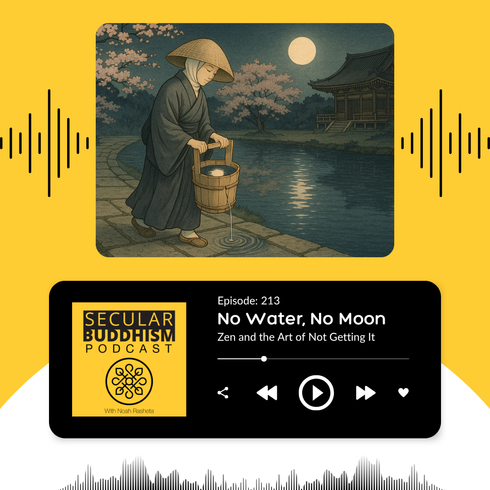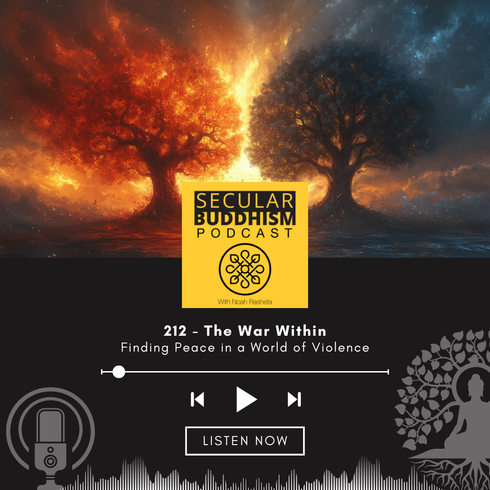
141 - Smarter Not Harder
I’m sure you’ve heard the expression “work smarter, not harder”. In this episode, I will share my throughs regarding Skillful Effort of the Eightfold Path and how it pertains to not only mindfulness practice but to everything we do in life.
Transcript:
Hello and welcome to another episode of the Secular Buddhism Podcast. This is episode number 141. I am your host, Noah Rasheta. Today I’m going to talk about skillful effort. As always, keep in mind, you don’t need to use what you learned from Buddhism to be a Buddhist. You can use what you learned to be a better whatever you already are. If you’re new to the podcast and you’re interested in learning more about Buddhism in general, check out my book, No-Nonsense Buddhism for Beginners, available on Amazon. Or you can start out by listening to the first five episodes of this podcast. Also, check out my new online workshop called Mindfulness For Everyday Life, available on Himalaya, a new educational audio platform. You can find information about that by visiting himalaya.com/mindfulness and give it a try with the promo code mindfulness for a 14-day trial to listen to not only my workshop but hundreds of other workshops that are available there as well. If you’re looking for a community to practice with and to interact with, consider becoming a patron by visiting secularbuddhism.com and clicking the link to join our online community.
In this podcast episode, I wanted to share some of my thoughts regarding the topic of effort. In Buddhism, we follow what’s called the eightfold path, these are eight specific areas that you focus on to live a more mindful life. The eight areas are right understanding, right intent, right speech, right action, right livelihood, right effort, right mindfulness, and right concentration. I’ve talked about these in general. I’ve talked about the eightfold path in general on the podcast before. I’ve mentioned it, of course, in my book. I wanted to discuss some thoughts that I have regarding one specific aspect, which is effort. If you visualize real quick, the symbol of Buddhism is a wheel with 8 spokes. These eight spokes represent these specific areas, these eight areas. Some people have divided these into three general groups, the group of pertaining to wisdom, which would be understanding and intent, the group related to ethical conduct, which would be speech, action, and livelihood.
Then the group pertaining to mental discipline, which would be effort, mindfulness, and concentration. Again, I’ve mentioned these before but I’ve never taken the time to share thoughts regarding one specific spoke of the wheel. Today I wanted to do that with regards to effort. Now, anytime you encounter the eightfold path, you’ll typically hear it described as right this and right that. Right understanding, right intent and so on. I’ve mentioned before that I prefer the term skillful because skillful means being such a prevalent concept in Buddhism. It’s not right versus wrong. It’s more of skillful versus unskillful. I would like to talk about effort in terms of skillful effort versus unskillful effort. This conjures up the expression that I’m sure you’ve heard, which is that we can work smarter, not harder. This is the first time I’ve correlated all of this in terms of Buddhist practice, and that’s because over the past few weeks I’ve been busy doing a lot of flying.
I had an eight day workshop where I was teaching four new pilots how to fly, followed by an eight day flying which is a gathering. You have vendors there and they’re showcasing their equipment. Then all of the attendees were spending all of our time doing as much flying as possible, just for the fun of flying. It was a really fun event, but I’d been gone from my family and from my home for the past two weeks on the road doing all this work. During the first week working with four new students, I had this thought of skillful effort because of an experience that I had. I had four new students and one student really stood out to me. He joined the class several months ago. He signed up for training and he expressed his concern first due to his age, 67 years old. As you start reaching, I would say your mid 60s, it’s common for some people to lose a little bit of their strength.
But to complicate things further for him, he has Parkinson’s disease. He was a little bit worried about how those complications would factor into doing all this physical effort that it takes to learn to fly a paramotor. For those of you who don’t know the process of learning to fly one of these entails, strapping a motor to your back that’s usually 60 to 70 pounds, and then running with that. Running to the point where you’re going fast enough to take off. We don’t have wheels in powered paragliding, at least not in foot-launch powered paragliding, which is what I do. Our wheels are our feet. You have to be able to run up to a certain speed to be able to take off just like an airplane has to get up to a certain amount of speed before it lifts off the ground. It’s the same for us, but we don’t have wheels, so it has to be our feet. My student was a little bit concerned as was I.
I told him, if you’re determined to learn, we’ll spend all the time that it takes. If it goes beyond the eight days, if it takes weeks or months, I will continue to spend that time with you and teach you as long as you put in the effort that it’s going to take to do it. That was how we left things. Then the day came for training to start. He was a little nervous. I was certainly a little nervous. He did remarkably well. This is where I started to see and experience firsthand what skillful effort looks like. He knew himself so well. He knew at what time he needed to take his medication. He knew how long it would take before the medication started to kick in. He knew when the window was open for him to go out and start practicing and doing all the effort and the work it was going to take to learn. Perhaps more importantly, he knew when that window was closing and he would be the first to shut it down and say, okay, I’m done. I can’t keep practicing because he knew that as the medication wore off and his Parkinson’s kicked in stronger.
Those were not skillful times to continue practicing and continue trying to push himself. As I observed this over the course of several days, I was pleasantly surprised to see how quickly he was learning because of the effort he was putting in. It wasn’t that he was trying really hard, he was trying in a very smart way. He knew when to be trying and when not to be trying. That to me was the correlation with this concept of skillful effort. I’m pleased to say he ended up being in the top of the class. He accomplished his goal. He learned to fly. He had six or seven flights throughout training that he did all on his own and he nailed it every time he took off. He was a textbook student. I was very pleased to see his progress because it is common in this environment for me to train students who come in with the mindset of wanting to be really gung-ho and just worked really hard and they’re tired but they keep going, and then they’re really tired and they still keep going. Then sometimes they get hurt.
They can sprain an ankle or they get heat exhaustion or things like that. It’s happened enough times to where I’ve had to structure in breaks into the curriculum because the students won’t take the breaks themselves. They’re just so determined to continue. I’ve had to build into the program the training style where people have breaks that they have to take and to hydrate, but also to take turns in a buddy system so that they can’t both be going hard 100% at the same time. That’s been very helpful. But this student didn’t need any of that. What I saw playing out in front of me was skillful effort. It was really neat to experience it, to see it unfolding, and to think the reason he’s doing so well is because he knows when to try, when he’s trying too hard, when he’s not trying hard enough. He found the balance somewhere right in the middle.
This reminds me a little bit of the discussion of the instrument with the strings, which comes again from the Buddhist teaching, that the instrument with the strings if tightened too tight sounds bad. If it’s not tight enough, that also sounds bad. But somewhere in the middle is the proper tension on the string and then that’s what makes the music play right. Picture a guitar, a guitar that’s not tuned properly doesn’t sound very good, but when it’s tuned properly, it sounds great. That’s how it works a lot of times with effort. There are times that we try too hard and there are times that we don’t try hard enough. Somewhere in the middle is skillful effort. Just the right amount of effort that you could almost say is smart effort.
That’s why I liked this expression of skillful effort. Now I see this in meditation practice, mindfulness practice when somebody decides, you know what, I want to start living more mindfully. They approach this practice and they say, you know what, I’m going to start meditating one hour every day and they’re determined. Then they get burned out after two or three days because that’s actually really hard to set aside a whole hour every day. I see that happen all the time. Again, this notion of maybe you’re trying too hard. Maybe it would be more beneficial to approach this with, what is the skillful amount of effort? Because that is very personal, right? The amount of effort that it takes for you to do something may be very different than the amount of effort that it takes me to do something or someone else.
In context of time as well, the amount of effort it takes me right now to be able to launch and fly a paraglider wing is minimal compared to the effort that it took many years ago when I was still new and learning. That’s how a lot of things are in life. The amount of effort that it takes with parenting, with school, with our kids, with the way we handle coworkers at work. I mean, you name it. Effort is something that affects everything that we do, every single aspect of our lives. I really like drawing this correlation between skillful effort and the invitation to look inward, to be more introspective. Like my student knew himself when it’s time to take medicine, when the medicine is wearing off, when he should be out on the field practicing, when he should be sitting down resting. All of that was introspection. He knew himself pretty well.
That has inspired me to want to do the same with regards to parenting or with regards to doing work. Any aspect of my life, I want to have a skillful amount of effort that I put into the things that I do. Now it’s funny, this episode I had already recorded this once and I didn’t realize till I was done recording that the microphone had been set on mute. I recorded the whole episode only to discover it hadn’t recorded at all and I had to rerecord it. Sometimes it’s hard for me to have to rerecord it because it’s like why I don’t remember what all I said the first time, because I don’t write any of this down. I just wing it as I go. This is round two on the topic of skillful effort.
I thought in between the two sessions, I didn’t immediately sit down and start recording. Once I realized what I had done, I realized, well, now is not the time to continue to sit here and just push through. I want to think this through and I want to be skillful in the effort that I put into when I’m going to rerecord. I took a little break. I stepped away from the computer. I went and ate a bowl of cereal. Went outside and worked on a couple other projects that are on my plate, got those done. Then I came back in and I said, all right, let’s try this again. I made sure the microphone was not muted this time. That’s where this specific podcast episode is coming from now, this is a round two. I don’t remember what things I said in the first version that didn’t make it into this one, and some things that I probably mentioned in this one that I didn’t have in the first version. That’s just how it goes.
For me, that is all about skillful effort. I could have decided right then, you know what? I’m just going to push through and get this done because I’ve already been sitting here for 15 to 20 minutes and just rerecord it. But maybe it wouldn’t have come across in the best way that it could because I would have been rushing to get it done because I’d be feeling in the back of my head I’ve already said all this. It’s fun to see it even in little things, this idea of skillful effort. It’s always arising, it’s always there. I always have the ability to ask myself, could I be more skillful with the effort that I’m putting into this or that? Whatever the thing is that I’m working on.
Whether that’s sitting to meditate, mindfulness as a practice, the effort I put into maintaining healthy relationships with the people that I love and care about, or recording a podcast, or packing my gear to go flying. Whatever it is, there’s effort involved. I am now entertaining this from the perspective of what kind of skillful effort can I be putting in, rather than just working hard for the sake of working hard. Again, I don’t want to discount the idea of working hard. I think hard work goes a very long way. I would say that’s the invitation at the end of this, that hopefully you’ll be able to take this concept and think about it in the context of work, or parenting, or going to school, or going out and walking your dog, or whatever. Whatever it is, or especially mindfulness, right?
Mindfulness as a practice. To be able to sit and recognize as you look inward, do I know myself well enough to be able to be more skillful with regards to the effort that I’m putting into this thing that I’m trying to do? To attack it from that angle of skillful effort versus unskillful effort. See if you can improve in any of those areas just based on the understanding that like my student, someone who knew himself pretty well was able to put in just the right amount of effort to excel and to accomplish the goal he had set out to do. As an update, he finished the course. He had seven solo flights by the end of everything. He did really well. Every single one of them was a successful takeoff and a landing. I was so proud of him and so impressed with the effort that he put in because he knew, I knew, and the other students in the class knew how hard it was for him to get through the training.
It was a very emotional and bonding experience when he landed from his first flight. We were all so proud of him and we were all hugging him and just so excited for what he had accomplished. Here with someone who is 67 years old and was finally living the dream of flying through the air with your feet dangling under you. It wasn’t easy, but he had just the right amount of effort to make that dream a reality. That’s at the heart of what I think we’re trying to understand when it comes to skillful effort in terms of mindfulness as a practice. Hopefully, some of that makes sense, and that’s all I have that I wanted to share in this podcast episode. I’m excited to be back home and getting caught up on my routine and to start recording other podcast episodes. Hopefully, not doing it while on mute. That’s all I have for this one. Thank you for listening. Until next time.



